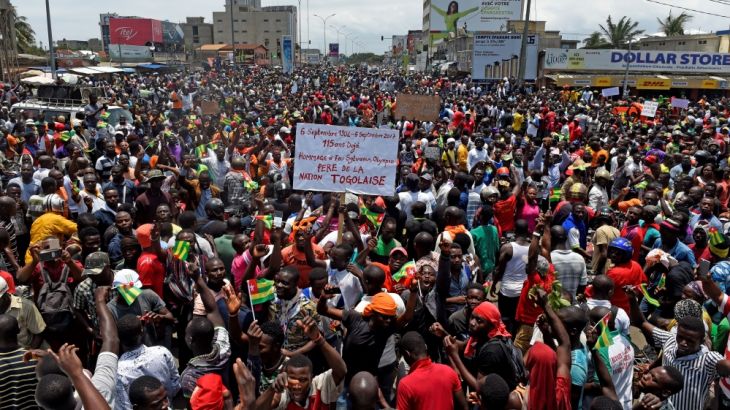Why are people protesting in Togo?
Thousands of Togolese take to the streets to demand an end to the 50-year-rule of the Gnassingbe family.

Thousands of Togolese took to the streets on Wednesday in the next phase of a campaign against the 50-year-rule of the Gnassingbe family, demanding the immediate resignation of President Faure Gnassingbe.
Authorities have often responded to the protests by blocking mobile and internet communication.
Mobile access to the internet was blocked on Wednesday by authorities.
As was the case in August and September during mass protests that drew tens of thousands of people.
Security forces cracked down on the previous nationwide demonstrations, leaving several people dead.
Why are people protesting in Togo?
Protesters are calling for the resignation of President Faure Gnassingbe, who has been in power since his father died in 2005.
Gnassignbe’s father ruled for nearly four decades, having initially taken power during a coup d’etat.
The two elections – in 2010 and 2015 – since Gnassignbe took power have been marred by controversy, with the opposition calling them fraudulent.
Protesters want to see the return of the 1992 constitution that allowed only two presidential terms.
In an attempt to appease his opponents, Gnassignbe tabled a draft bill in September that would reform the constitution and reintroduce a two-term limit.
But opposition leaders are sceptical that this would apply retroactively, and fear Gnassignbe would be allowed to run for two more terms.
A 14-party opposition coalition and civil society organisations have called for the latest rounds of protests suspecting that President Gnassigbe, who is on his third term in office, will seek re-election in 2020.
Read more: Life after near-death for Togo’s shot footballer
Where are the protests taking place?
Most protests are centred in the capital, Lome, and the northern city of Sokode.
Until 2017, most opposition against Gnassingbe was concentrated in or near the country’s seaside capital.
The anti-government protests have now spread to the rest of the West African country of seven million people.
Has Togo seen protests before?
It is not the first time calls for Gnassingbe to resign have echoed in the streets.
The protests that followed Gnassingbe’s first election victory in 2005 triggered a violent security crackdown in which around 500 people were killed.
Demonstrations also erupted in 2011, 2012 and 2014, when people also asked for electoral reform.
In the latest round of violence that began in August, at least two people were killed, according to officials.
Opposition leaders disputed that number and said at least seven people died during the protests.
In September, thousands of people again took to the streets to demand reform.
Security forces cleared barricades erected by demonstrators and fired tear gas at the crowds.
How has the government reacted to the latest protests?
Protests have largely been peaceful, but at least one person was killed and dozens were injured in September in a crackdown in the north of the country, a region previously seen as reliably pro-government.
The government has also limited internet access in the country, preventing demonstrators from organising on social media. Text messages have also been blocked.
Critics have called these moves by Gnassingbe’s government an attempt to suppress the protests.
How has the international community reacted to the protests?
The UN Special Envoy for West Africa and the Sahel, Mohamed Ibn Chambas, has called on all parties “to preserve peace and security”.
“I remain convinced that all parties want to move forward on the reforms … in order to reach a consensus to respond to the legitimate expectations of the Togolese people,” Chambas said in a statement last month.
Tel Aviv indefinitely postponed the Israel-Africa summit that was scheduled for late October in Togo due to rising unrest in the country.
“The decision was linked to the internal situation in Togo. The situation is seen to be unstable, and they (Togo’s government) asked to postpone,” Emmanuel Nahshon, spokesperson for the Israeli foreign ministry told Al Jazeera last month.
Using #TogoEnMarche (Togo on the move) on Twitter, people in and outside of Togo are voicing their discontent with Gnassingbe. The Togolese diaspora has called for marches in several cities around the world, including Montreal, Paris and Washington, DC.